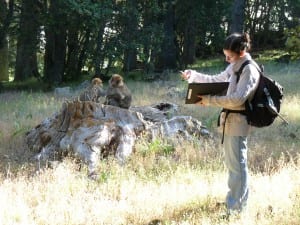 Education
Education
2010: Ph.D. in primate behaviour. School of Psychology, University of Lincoln, U.K.
2008-2009: Research Master in Ecophysiology Ethology. Université Louis Pasteur, Strasbourg, France. Projects: 1) Hand preferences for unimanual and coordinated bimanual tasks in squirrel monkey (Saimiri sciureus); 2) Consistencies in hand preferences across time, and across population, for handling (unimanual and coordinated bimanual tasks) and communicative gesture in Olive baboons (Papio anubis). Université de Provence, Centre psyCLE, Station de Primatologie du CNRS de Rousset (France).
2007-2008: Master in Ethology. Université Paris XIII (Villetaneuse, France). Project: Cognitive limits of the profit maximization: an experimental study of the exchange in brown capuchin (Cebus apella) and Crab-eating Macaque (Macaca fascicularis). DEPE, CNRS. Centre de Primatologie de l’Université Louis Pasteur (Strasbourg, France).
2005-2007: B.Sc in Sciences de la Vie, parcours 1 Recherche. Faculté des Sciences de Valrose (Nice, France).
Research interests
I am highly interested in cognitive ethology, biological market, game theories, and most significantly in social cognition. During my PhD supervised by Dr. Majolo, I aim to assess the mechanisms underlying the choice of social partner in cooperative interactions, in populations of wild Barbary macaques (Macaca sylvanus) living in the Middle Atlas Mountains of Morocco.
Acts of cooperation are seen every day in humans as our societies are based upon cooperation. By working together, individuals can obtain benefits that they could not attain alone. However, cooperation is costly and at risk of exploitation, as the returned benefit is not guaranteed. Choosing the best available partner improves the chances to establish a successful cooperative interaction and decreases the chances to be exploited. To understand the evolution of the mechanisms underlying partner choice in human cooperation, we need to assess this point in our closed relatives: non-human primates.
Group-living animals live in complex social groups and can choose the social partner to interact with among several individuals differing in, e.g. social skills, competitive power or relationship quality with the other animal. The capacity to make effective choices among potential social partners is thus an important social skill. I propose to experimentally assess in free-ranging animals how individuals choose social partners with whom to cooperate and what mechanisms underlie their choice of social partner. The Barbary macaque, a relatively tolerant macaque species, is an excellent model species for these topics as it lives in groups composed of individuals of different sex and age where cooperative interactions (e.g. grooming or agonistic support) are frequent.
Publications
Meguerditchian, A., Donnot, J., Molesti, S., Francioly, R., & Vauclair, J. (2012). Sex difference in squirrel monkeys handedness for unimanual and bimanual coordinated tasks. Animal Behaviour, 83, 635-643.
Meguerditchian, A., Molesti, S., & Vauclair, J. (2011). Right-handedness predominance in 162 baboons for gestural communication: Consistency across time and groups. Behavioral Neuroscience, 125(4), 653-660.
Conference proceedings and talks
Meguerditchian, A., Molesti, S., Vauclair, J., & Hopkins, W. D. (2010, September). Consistency in right-handedness for gestural communication across time and across different groups of captive baboons and chimpanzees. Oral presentation at the the 23th International Primatological Society Congress. Kyoto, Japan.
Contact: smolesti@lincoln.ac.uk